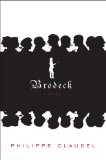Blog Headline of the Week
Blog Line of the Week
- Libraries can be confusing places — what with all those dern ideas and books and things. (Here’s more details on the kerfuffle of Michelle Obama’s socialist books in the White House.)
Interesting Reading in the Interweb Tubes
- The Return of Ancient Viruses: Freed from Glaciers in a Warming World
- Roger Ebert: The Essential Man
Bookish Linkage
- The Electronic Frontier Foundation offers readers a checklist of “Digital Books and Your Rights.”
- The 10 book shortlist for the Best Translated Book Award was announced this week. I am surprised I’ve not read any of them, although one is on the TBR shelves and two have been on my Amazon wishlist for months. I am disappointed that Every Man Dies Alone did not make the cut.
- The finalists for the 2009 Nebula Awards have also been announced. Although my consumption of SF seems to have declined, I have read one of the finalists for best novel. (Via.)
- The shortlist for the Diagram Prize for Oddest Book Title of the Year has been announced. (Via.) None of my favorites made the list.
- This I did not know. Several European countries have laws restricting sales of books below the publishers’ recommended price.
- The Telegraph profiles Ian McEwan.
Nonbookish Linkage
- Hmmmmm. Really, really hot space pr0n.
Art is anything you can get away with.
Marshall McLuhan, Understanding Media

![Musing_Mondays2_thumb[1]](https://prairieprogressive.com/wp-content/uploads/2010/02/Musing_Mondays2_thumb1-150x89.jpg)







